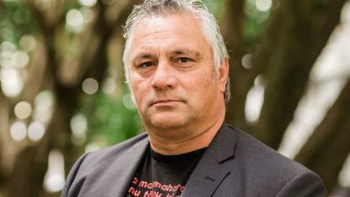Warning: This story may be distressing for some readers.
A pest management expert says the poisoned sparrows found outside an Auckland bakery are highly unlikely to have been poisoned in a controlled cull performed two weeks ago.
Video of sparrows struggling to walk or fly outside the Pt Chevalier branch of the popular Daily Bread chain went viral this week, with complainants claiming that the store had poisoned the birds.
Daily Bread conceded that they had contracted a third-party pest controller two weeks ago, but claimed that no further poisoning had taken place since and noted that the birds were found in carpark shared with neighbouring businesses.
Dr Paul Craddock, a pest management and biosecurity expert, said he had reviewed the footage and believed it was highly likely they had ingested alphachloralose and highly unlikely that it was from the cull performed a fortnight ago.
Alphachloralose is an anaesthetic, Craddock explained, and worked with an hour of ingestion.
He said there was a small possibility that they had consumed an older piece of bait that contained a dose of the toxin, but said any material remaining from an operation two weeks ago would have likely already been consumed by another animal.
“That’s an operation that has taken place in the last couple of hours. You wouldn’t be seeing that number of birds drop out of the sky if there hadn’t been an operation within a few hours.”
What is alphachloralose?
Craddock told the alphachloralose was the most commonly-used bird poison and put birds to sleep.
The chemical, which is able to be purchased and used without a license, would knock the birds out and users needed to be careful to get the dose right.
Too much would kill the bird outright and too little might see it fly off and collapse elsewhere, which might cause distress to onlookers.
When the birds fell asleep they could then be collected and euthanised. He said the professional pest controllers were careful to put the toxin out in the early morning and then sweep the area shortly afterwards to collect the birds.
“Thats how a good operation should proceed,” he said.
“But of course you can’t guarantee you’re going to get every single bird.
“It’s absolute dog of a job, I’ve done it myself,” he added.
“I hate it, it’s not pleasant.”
He said controlling sparrows with physical barriers was exceedingly difficult as the animals had shown the ability to learn how to activate automatic doors to gain access to indoor spaces.
Describing sparrows as “like feathered mice”, Craddock said pest bird control was just as necessary as rodent control but “is in people’s faces and looks terrible”.
“It’s an unfortunate necessary evil sometimes, but there’s nothing better and that’s the problem.
“I don’t like it and lot of pest controllers just don’t like doing it.”
Eight birds survived
Eight poisoned sparrows recovered from outside the bakery have been nursed back to health and released into the wild.
Nine of the birds were taken to BirdCare Aotearoa’s hospital in Green Bay after they were found outside the Pt Chevalier branch of Daily Bread on Tuesday.
Chelsea Crossley from BirdCare told the Herald one bird died in transit to the hospital but the birds they treated were healthy enough to be released into the skies above Green Bay on Wednesday evening.
She said BirdCare was told by the SPCA that a number of dead birds were found in the area when the survivors were initially transported.
Crossley said the birds received fluids and the poison appeared to have passed through them quickly but could not confirm which specific poison had been used.
Daily Bread found Josh Helm told the Herald on Wednesday that their pest control was done humanely.
The popular chain issued a statement on social media this morning telling customers that their “thoughts matter”.
“We assure you that our pest control practices, commonplace in our industry, not only comply with stringent food safety standards but also specifically address potential health risks associated with bird population,” the statement read.
“We’re actively working with our partners to find alternative ways to handle pests.”
An SPCA spokesperson said its investigation into incidents involving dead sparrows was ongoing and its inspectorate team were working to gather all information relating to this case including toxicology testing to determine cause of death.
“Anyone with information about pest management measures being employed by businesses or individuals or who have witnessed attempts to eradicate birds is urged to contact SPCA,” the spokesperson said.
A spokesman for the Pest Management Association of NZ (PMANZ) told the Herald that treating for birds was a “difficult subject” for pest controllers.
He said that physical barriers were hard to maintain in restaurants and cafes, leaving two options: Poisoning or shooting.
“Neither of which is particularly attractive,” he said.
Jonathan Simes, general manager of Smash’ed Em Pest Control, said the furore over the video was a “storm in a teacup” but said he understood why the public would be distressed by seeing injured birds.
His company was not contracted by Daily Bread, speaking generally he said:“But the other side is: Who wants to see bird poo in their bakery sandwich?” he said, noting that contamination from bird faeces was a “major risk”.
Helm said that the consequences of birds being on site could be severe and argued it was common practice in the hospitality industry to use third-party pest controllers.
Steve Armitage, chief executive of Hospitality New Zealand, told the Herald that pest removal is a necessary measure to comply with strict food standard, health and safety regulations but said that Hospitality NZ understood that poisoning was not a widespread or common practice.
“If a business has an infestation that’s potentially putting customers at harm, businesses will generally try other avenues of pest control in the first instance, with poison being a last resort,” Armitage said.
‘Hard to fathom’
Videos of the sparrow struggling to move outside Daily Bread prompted a furious response from animal lovers, but the bakery says the birds are pests and risk contaminating food.
Auckland woman Mimi Kelly was visiting the Point Chevalier branch of Auckland’s Daily Bread bakery chain on Tuesday when she saw sparrows outside the business looking “very unwell”.
Kelly told the Herald that the small birds appeared poisoned, were struggling to hop about and being targeted by seagulls.
She claims a staff member told her the birds had been deliberately poisoned because the business had a health inspection due soon.
Helm has defended the controlled cull, saying the birds pose a potential health risk and maintaining health and safety standards is the number one priority for his business and customers.
Kelly recorded video of the birds and her encounter with another member of staff, who denied being involved with poisoning the birds but admitted they did appear to have been poisoned.
She contacted the SPCA, which arranged for the surviving animals to be taken to BirdCare.
When Kelly emailed Daily Bread for answers, she received a response telling her that sparrows were pests and posed a health risk.
“We have had in-depth conversations with our pest control company and they (as well as the Department of Conservation’s research) deem sparrows and pigeons as pests that have been introduced into NZ,” the response read.
“The pests are non-native, meaning they are the most detrimental non-native bird species for our native biodiversity that we know, love and cherish.”
The email said the birds also “risk the contamination of food, ingredients that we have stored in our venues and the general venue space where our guests dine”.
The birds built large nests which could also pose a fire hazard and spread bird lice, “so we deem removing them from our venue a positive solution for the safety of our customers”.
“We are continuing to work closely with pest control to find more humane ways of deterring the pests from our venues, as many other Auckland businesses are having issues with. If you did have any suggestions, we are completely open to hearing them.”
Kelly posted the videos online, where people expressed shock. Kelly said she shared that distress and was devastated when she learned the poisoning was deliberate, saying it was “hard to fathom that someone would be so cruel”.
Asked how different this poisoning was to targeting other pests such as rats, Kelly said “everybody loves sparrows” and labelled the birds “poor wee innocent souls”.
She said there were other ways Daily Bread could have handled the situation.

A poisoned sparrow outside the Daily Bread bakery in Pt Chevalier.
Helm said contracting a third party to perform the pest removal was a “last resort” and done under strict guidelines and outside business hours.
It was incorrect to say the poisoning was done directly before a health inspection, Helm said.
Helm acknowledged that the consequences of birds being on site during an inspection could be severe and said it was common practice in the hospitality industry to use third party pest controllers.
His business received an A Grade following inspection, but had a bird been seen inside, it would have received a D grade.
He said the top priority was “maintaining a high health and safety standard” and said that the pest removal was done in a humane manner.
- Additional reporting, Ava Whitworth
Chris Marriner is an Auckland-based journalist covering trending news and social media. He joined the Herald in 2003 and previously worked in the Herald’s visual team.
Take your Radio, Podcasts and Music with you









